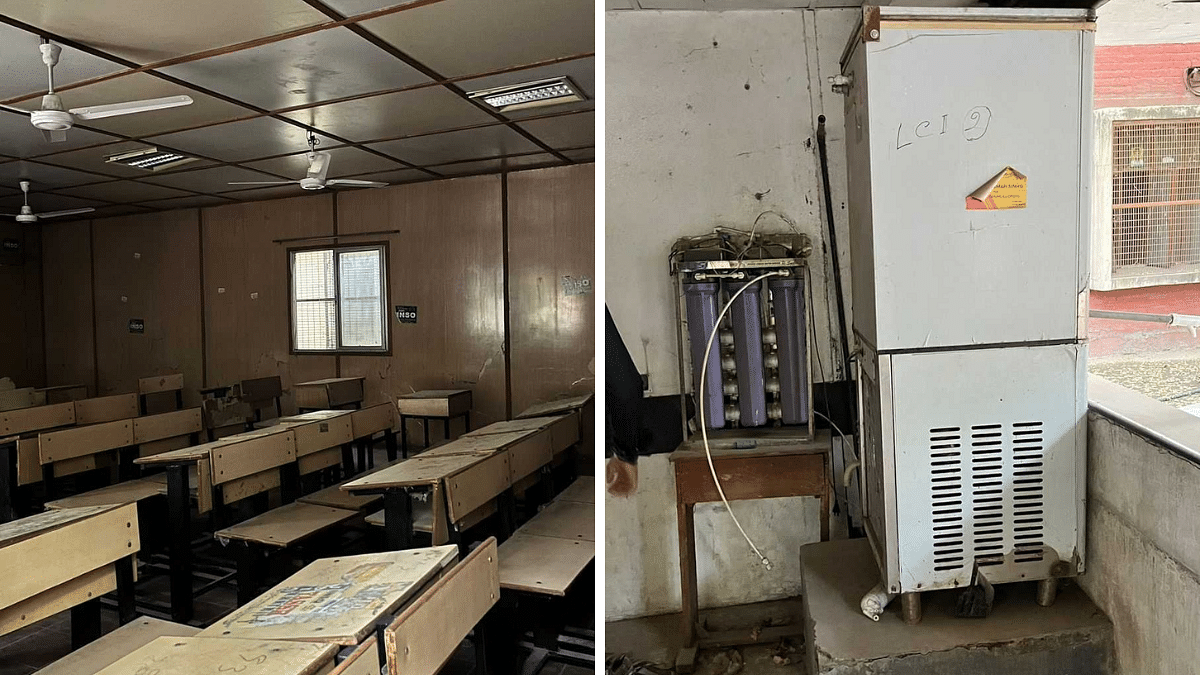New Delhi: Three law students have sued Delhi University after suffering heatstroke and contracting typhoid, allegedly as a result of drinking from a cooler at its Faculty of Law.
The Delhi High Court this week ordered a meeting of various stakeholders based on the plea, which alleged a lack of purified drinking water in the premises, bad air conditioning and Wi-Fi, and other faulty infrastructure on the campus.
Ronak Khatri, Ankur Singh Mavi and Umesh Kumar – all second-year students at the Faculty of Law – are batchmates who are fighting for better infrastructure at the university. They are the petitioners and also the advocates in the case. But it was a move they had to take after all doors were closed to them.
“On 2 May, we protested on (the Faculty of Law) campus. We handed a letter to our dean but no action was taken. We also approached the Delhi Students’ Welfare and Delhi University Students Union, but to no avail. So, on 15 May, we held a protest in front of the vice chancellor’s building,” says Khatri, who suffered from heatstroke and fainted during class in May.
During the second hearing in the case on 12 June, Justice Amit Sharma passed an order appointing advocate Rajesh Mishra as amicus curiae to help examine and resolve the matter.
The high court directed that a meeting take place involving Delhi University’s dean of students’ welfare, the dean of the Faculty of Law, petitioner Mavi and the amicus curiae.
The discussion is to focus on the provision of water coolers or purified drinking water as well as other infrastructural facilities, including the availability of Wi-Fi services. The court also ordered that the meeting be held within a week.
Justice Sharma also included the Bar Council of India (BCI) as a “necessary party” to the petition.
The writ petition was filed on 27 May and the next hearing is on 4 July.
Also read: DU India’s best performer in global QS sustainability rankings. But no Indian institution in top 200
Sizzling classrooms
Situated in Delhi University’s north campus, the Faculty of Law comprises three colleges — Law Centre 1, Law Centre 2 and Campus Law Centre. Classes for all three centres are held in four buildings, located adjacent to each other.
The writ petition in the high court said: “The lack of air conditioning in classrooms has created unbearable conditions, especially during peak summer months when temperatures in Delhi can reach up to 48°C. The classrooms in Building 1 have no air-conditioners installed whatsoever whereas Building 2, and 3 are not equipped with functional air conditioning, making it extremely difficult for students to focus and study.”
The plea said that Building 3 was constructed with makeshift materials — tin roofs and asbestos-lined walls. It was in one of these classrooms that Khatri fainted.
A research scholar who has seen the campus since the early 2010s said the law faculty’s infrastructure was “always outdated”.
“The infrastructure issues would arise during elections but nothing was done,” they said, requesting anonymity.
Another PhD researcher said the reason for the students approaching the court could be that “the department was holding classes in June for the first time”.
Mavi said their request for online classes was not considered.
Also read: India saw 329 heatwave days in 2 yrs, media coverage lukewarm — 2 reports highlight dual challenge
In search of drinking water
While Khatri and Mavi suffered from heatstroke, Kumar contracted typhoid on 9 May after allegedly drinking water from a cooler on campus.
“I enrolled on campus in December 2022. There have been water issues for the past 1.5 years. But during winters we could make do without water or just a bottle. This time, we had classes during the summer. A bottle of water isn’t enough and we can’t buy water all the time,” Kumar said.
All these problems brought the students together. Khatri said that nearly 3,000 students from the Faculty of Law signed an online petition complaining about the poor infrastructure.
All three petitioners as well as two research scholars said students going up against their institution was a rare occurrence at the law faculty. But, Kumar said, “There is illogical fear. We are fighting for our fundamental rights and no individual or institution can stop me from raising my voice for the right cause.”
(Edited by Tikli Basu)
Also read: CUET coaching industry is the new boom—EdTech firms, UPSC centres, tuition academies are in

